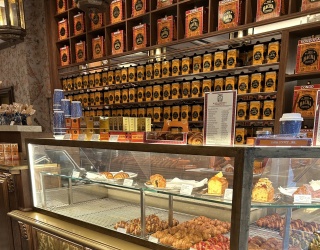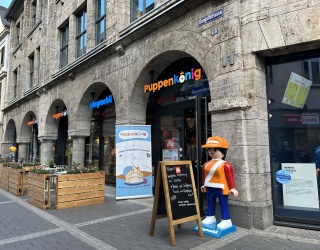The ongoing debate over shopping hours on Sundays has heated up in recent months in Germany. Ver.di (the German trade union) successfully filed lawsuits against a number of Sunday shopping events nationwide. Communities and retail representatives view Sunday shopping hours as a great way to attract visitors to do some shopping in city centers. But is the loosening of the “no shopping on Sunday“ rule the answer to the pressure exerted by e-commerce giants on brick-and-mortar businesses?
“Retail associations are hurting themselves by asking for Sunday shopping settings. After all, how can you expect online retailers […], package services, banks, repair shops and insurance companies to be closed on Sundays if Sunday shopping is granted to the retail industry? If everyone works on Sundays, the cat attacks and bites its own tail.“ (Stefanie Nutzenberger, Ver.di)
The judicial problem affecting Sunday shopping: Event Reference
The German Shop Closing Law (German: Ladenschlussgesetz), which is typically covered by state laws stipulates that the majority of retail outlets have to generally remain closed on Sundays. In 2009, Germany’s Constitutional Court has upheld this law and confirmed that Sunday should be kept as a day of rest to ensure the constitutionally protected rights to freedom of religion, health, marriage, and family.
Exceptions are Sunday shopping hours that are limited to four Sundays per year in most German states and permitted by the respective communities. However, this needs to be tied to events such as local festivals or trade fairs. In a finding in 2015, the German Federal Administrative Court specified that the events per se must attract a significant number of visitors to justify Sunday opening hours.
In the past few years, numerous Sunday shopping events were canceled – sometimes at the last minute – precisely because of this ambiguous justification. Meanwhile, these cancellations can result in financial losses and damage the image of communities and retailers.

More or less deregulation – Turf war over Sunday shopping
All stakeholders agree that this issue necessitates a clear, legally binding regulation. The German Retail Federation HDE thus demands that “our businesses should be able to implement Sunday shopping events permitted under the respective state laws in a legally compliant and reliable manner.“ However, from this point forward, the stakeholders split into different camps.
Their demands run the gamut from complete deregulation to a ban on Sunday shopping. Symbolic of these two opposing forces are the “Selbstbestimmter Sonntag“ initiative (English: Self-determination Sundays) that advocates Sunday shopping – initiated by Karstadt, Kaufhof, KaDeWe Group – and the ”Allianz für den freien Sonntag“ (English: Alliance for a Work-Free Sunday) by the Catholic Employee Movement (Katholische Arbeitnehmerbewegung). The former asks to let retailers open their stores every Sunday, while the latter maintains that two days of Sunday shopping per year are enough. This calls for a binding national regulation, as well as an evaluation of shopping hours. In reality, it is difficult to find general and conclusive studies that definitively substantiate the drawbacks or advantages of more liberal opening times of stores.
“There is a considerable increase in foot traffic, the number of shoppers and average sales on Sundays compared to other days of the week. Customers also tend to make more (impulse) purchases.“ (A spokesperson of the Self-Determination Sundays initiative)
The proponents of Sunday shopping consider it an effective tool to improve the experience and the quality of visits to city centers. According to Kai Falk of HDE, this is necessary since “the demographic trends and a change in consumer behavior have resulted in a decreasing number of visitors in town centers. Occasional Sunday shopping hours can effectively counteract this trend.“
Attracting customers to city centers again – brick-and-mortar versus online
Making shopping attractive in local communities is definitely the right approach. Yet it becomes a problem if Sunday shopping is touted as the remedy for all the difficulties facing the brick-and-mortar retail sector.
The “Self-Determination Sundays“ initiative wants to create “equal opportunities in the battle against pure online players“ with the help of Sunday shopping. “When stores are closed on Sundays, customers tend to shop online […] versus spending their money at local city stores on weekdays,“ explains a spokesperson for Galeria Kaufhof.
“Interesting small stores are not fond of Sunday shopping because they are unable to afford it based on their number of employees […]. Town centers that are dominated by the same chain stores you can find anywhere do their part in crowding out the remaining small stores.” (Stefanie Nutzenberger, Ver.di)
But this is exactly the point where arguments fall short. Retailers can’t beat the pure online player competition by simply offering everything major e-commerce companies have to offer. After all, customers can also access brick-and-mortar retailers 24/7 via their respective online stores. That’s why it might be essential to become the customer’s first go-to destination – no matter the channel – and to ensure that major e-commerce retailers are not the only beneficiaries of online orders.
Creating a customer journey that measures up to the new consumer behavior
It’s true that consumption and shopping are becoming an inherent part of recreation. Certain sectors like the furniture industry, tourism, and food service industry can also benefit from Sunday shopping. The legal framework should take this trend into account.

That being said, buying patterns per se are also changing. Customers research online, compare prices or later order items online after they checked them out at the store. The sales figures for any one particular Sunday shopping event or online shopping cannot necessarily be transferred to brick-and-mortar stores over a long period or in a one-size-fits-all manner.
For most retailers, the solution is not as easy as offering the same experience on Sundays as they do the rest of the week. After all, customer expectations are rising in a fundamental way: shopping is meant to be more convenient and faster and should seamlessly align with the online behavior of consumers. Thanks to perfectly implemented omnichannel concepts, a great shopping experience, and competent customer service, stores can set themselves apart from pure online players, even on weekdays.









